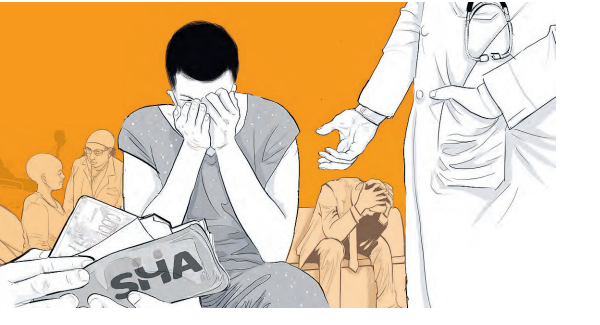 STAR ILLUSTRATION
STAR ILLUSTRATION
Imagine this: A mother in Turkana walks 20km under the scorching sun to the nearest health clinic, only to be told there’s no medicine.
In Nairobi, a father skips meals to save for his child’s hospital bill. Meanwhile, a hospital in Kisumu turns away patients because it hasn’t received its funding for months.
These aren’t isolated incidents—they’re the real-life consequences of a healthcare system running on empty.
Kenya dreams of universal health coverage, where every citizen has access to quality healthcare.
But for many, that dream feels further away than ever. The question we must ask is: Are we doing enough to make it a reality? Let us humanise the facts focusing on the decline in health budgets, the heavy burden of out-of-pocket costs and lastly the promise and pitfalls of UHC.
Hopefully this can bring the message home to you at home, that these issues affect you daily. In 2018, Kenya was spending Sh5,597 per person on healthcare.
Today, it’s down to Sh4,157—less than the price of a family dinner at a modest Nairobi restaurant.
This isn’t just a number; it’s the cost of a mother not getting prenatal care or a child missing out on life-saving vaccines.
While the government touts progress, the math doesn’t lie: we’re spending less on each Kenyan’s health than we did five years ago.
If you’ve ever had to empty your savings to pay a hospital bill, you’re not alone. Out-of-pocket expenses now make up 25 per cent of all health spending in Kenya.
This means many families are one illness away from financial ruin.
For comparison, the WHO says this number should never exceed 20 per cent. What does this look like on the ground?
A boda boda driver in Kisii delaying a hospital visit because he can’t afford the consultation fee, or a market vendor in Mombasa watching her child suffer because treatment costs more than her monthly earnings.
The government has rolled out the Social Health Insurance Fund to replace the much-criticised NHIF.
On paper, it’s a game changer: primary healthcare at no cost for all citizens. But on the ground, the cracks are already showing.
Hospitals are still owed billions from the NHIF era. Meanwhile, rural clinics are wondering how they’ll keep the lights on with the limited funding allocated to primary care.
Here’s the harsh truth: a policy is only as good as its implementation.
If SHIF isn’t backed by real funding and genuine accountability, it risks becoming just another promise that failed to deliver.
Are there solutions we can fi nd for the problems we are facing? The answer is absolutely yes.
Let me outline some of them here:
MAKE EVERY SHILLING COUNT
Kenya has a problem not just with how much we spend, but how we spend it. Imagine a community clinic in Narok that finally receives funding in June—too late to buy supplies for the year.
This kind of ineffi ciency wastes precious resources. We need better planning and faster disbursements to ensure every shilling is used effectively.
REDUCE THE BURDEN ON FAMILIES
Let’s look at Rwanda, where out-of-pocket costs are less than half of what they are in Kenya.
Why? Because their health insurance system includes even the poorest households.
If we invest in proper risk-pooling under SHIF, we can protect families from falling into poverty when illness strikes.
INNOVATE TO FUND THE FUTURE
Why not tax sugary drinks or tobacco to fund healthcare? Why not explore health bonds like Nigeria, where citizens invest in health projects?
These aren’t pie-in-the-sky ideas—they’re practical solutions we can adopt.
Healthcare is not just a statistic or a line item in a budget. It’s the mother in Turkana, the boda boda driver in Kisii and the market vendor in Mombasa.
It’s you, me and everyone we care about. The next time we hear about UHC, let’s ask the tough questions: Are we funding it properly?
Are we holding leaders accountable? Are we, as citizens, doing our part to push for better policies? Kenya’s healthcare system isn’t just failing—it’s failing us. But together, we can turn things around. The time to act is now.









